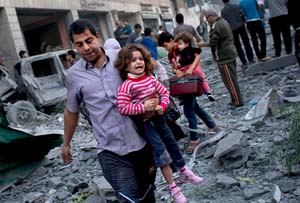Gaza City, Jul 13: Palestinian families flee their homes in northern Gaza Strip as the Israeli military is preparing to unleash large-scale bombardment of the besieged territory.
The displaced families have sought refuge at a United Nations school in Gaza City.
“What has happened to us is that we didn’t want to leave the house. But they threw bombs on us, firing with their tanks, from the sea, from the air, so there was nowhere to hide in the house. It was like our home was going to go red with all the flames,” said Mohamed Salem, a Gaza resident.
Ignoring international pressure for an end to the attacks, Israel has widened its range of Gaza bombing targets to civilian institutions.
Israel on Saturday announced that it will hit northern Gaza Strip “with great force” as it masses troops and tanks on the border with the impoverished Palestinian coastal sliver.
The Tel Aviv regime claims that the operation will target the rocket launchers of Palestinian fighters, but reports say civilians have been the main victims of the bombardments.
Israeli warplanes have bombed some 1,300 targets in the Gaza Strip, killing at least 165 Palestinians since July 8. According to a UN report, nearly 80 percent of the victims have been civilians.
In response, Palestinian resistance fighters fired retaliatory rockets into the occupied territories.
People in Iran, the United States, Jordan, Tunisia, Turkey, France, Indonesia, Britain and several other countries have taken to the streets, calling for a halt on the Israeli attacks.
Israeli Prime Minister Benjamin Netanyahu said on Friday that the Tel Aviv regime will not stop its attacks on the Gaza Strip.
“No international pressure will prevent us” from attacking Gaza, said the Israeli prime minister.





Comments
Add new comment